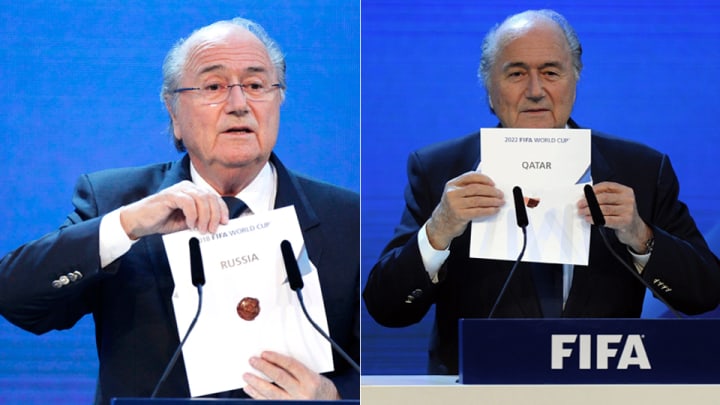Six years later: Looking back at the day Russia, Qatar World Cup bids won

Six years ago today, then-FIFA president Sepp Blatter revealed that Russia and Qatar would be hosting the 2018 and 2022 World Cups, respectively, sparking shouts of controversy, conspiracy theory and corruption in many parts of the world. Those shouts only escalated in volume in the following years, and they were validated in May 2015, when Swiss and U.S. officials indicted and arrested FIFA officials and high-powered executives in a landmark series of events in the attempt to clean the world's game.
Despite the connection of the 2018 and 2022 World Cup bids to FIFA corruption, there are no indications that either Russia or Qatar will lose its hosting rights.
This is what SI's Grant Wahl wrote on Dec. 2, 2010, from the scene of it all:
ZURICH – The Baur au Lac hotel, a five-star palace on the banks of Lake Zurich, was the epicenter of The Game here this week: The final lobbying of the nine bids vying to host the 2018 and 2022 World Cups. As the official hotel of the FIFA Executive Committee, the 22 men who choose the World Cup hosts, the opulent Baur au Lac welcomed all manner of dignitaries this week, from former President Bill Clinton and David Beckham to Prince William and British Prime Minister David Cameron.
On Wednesday night I shared a couch in the lobby bar with Mia Hamm and her husband, Nomar Garciaparra. And on Thursday night, after FIFA had chosen Russia '18 and Qatar '22 as the big winners, I came back to the Baur au Lac to try to make sense of how Qatar–a nation the size of Connecticut, one that had been deemed a "high risk" by FIFA's own inspectors–had swept aside the U.S. with ease to win one of the biggest prizes in sports.
It was, to put it mildly, an intriguing scene. I got propositioned by an attractive Russian hooker and politely declined–perhaps Russia's only defeat of the day. And I discovered just how much slithering chutzpah the voters of the FIFA ExCo really have. As it turns out, several of the FIFA voters were unaware (seven hours after the fact) that the round-by-round secret-ballot vote totals had been released to the public.
The result: By 11 p.m. on Thursday, at least three FIFA voters had told England '18 bid committee members that they had voted for them–even though England only got two votes in a first-round elimination. And at least three voters had told the Australia '22 bid committee the same thing, even though only one had voted for the Aussies.
This was my first time covering a FIFA World Cup host selection week, and I leave here with one lasting impression: The closer you get to the voting process, the more opaque it becomes. FIFA goes to great lengths to make it seem as though the competition is based on the merits, asking for thousand-page bid books, sending inspection teams to each country and commissioning economic-benefit studies by top consultants. And by those standards, the winners of the bids Thursday would have been England for '18 and the United States for '22.
But the merits don't really matter much, not compared to whatever personal concerns motivate those 22 men of FIFA, who (like the Vatican) have no check on their power. England was humiliated in its first-round departure, and the U.S. never got close to Qatar, which came within one vote of a majority on the first ballot.
The common link between Russia and Qatar, besides being new territories for the World Cup, is that they had by far the wealthiest bid budgets. If FIFA wanted to avoid the perception that it isn't entirely clean, it probably shouldn't have chosen the two bidding countries whose economies are awash primarily in petrodollars. (If you want to see the connection between the world's petro-economies and corruption, check out one of the many studies on the subject.)
Jurgen Klinsmann leaves behind a complex, unfulfilled U.S. Soccer legacy
This isn't a sour-grapes rant from a U.S. writer, either. Choosing Australia, another first-time host, would have left a cleaner impression than going with Qatar.
But it's all in The Game when it comes to FIFA, and the U.S. should know that by now. Is it possible to win the World Cup hosting rights playing by the rules? I doubt it. At the very least you have to venture into the gray areas to have a chance, and U.S. bid chair Sunil Gulati proudly proclaimed that the U.S. bid didn't even enter those gray areas.
With this FIFA bunch you have to if you really want to win. And that doesn't just apply to World Cups. The International Olympic Committee may have a somewhat cleaner reputation these days–cleaner, at least, than FIFA's–but is it any coincidence that the last successful U.S. bid for an Olympics or World Cup was the notoriously shady one from Salt Lake City?
As I sit here in the Zürich airport on Friday morning, I'm left wondering: Why don't the U.S. and England bid committees stand up to FIFA? Why can't U.S. Soccer follow the lead of England bid chief Andy Anson and say it shouldn't bid again until FIFA has more transparency? FIFA is only powerful as long as its members invest it with that power. And based on what I've seen here this week, FIFA is still awaiting its Salt Lake City moment.
